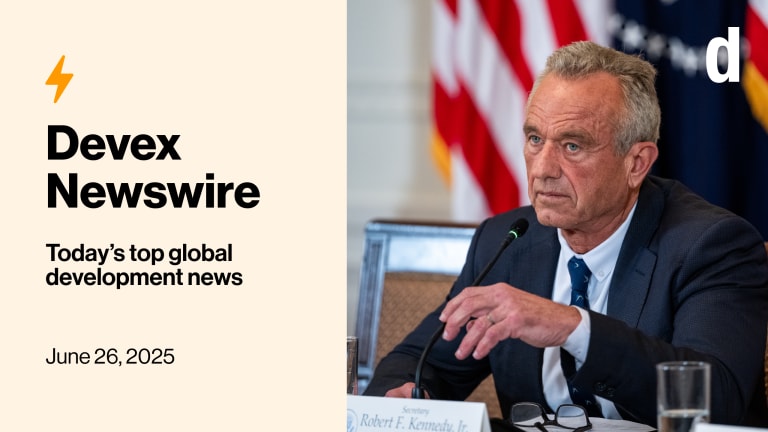
The Trump administration may get a case of the Monday blues because of a court ruling yesterday.
Also in today’s edition: Peter Marocco had a closed-door briefing — we have the inside scoop. Plus, drama at USADF.
+ On Tuesday, March 11, we’ll bring you an exclusive live analysis of the current state of U.K. aid. We’ll be joined by senior figures from the U.K. development community to assess the impact of the recently announced aid cuts on the wider state of world affairs. Register now to join us.
D-day
This is a preview of Newswire
Sign up to this newsletter for an inside look at the biggest stories in global development, in your inbox daily.
In the latest legal twist, the Trump administration has been given until 6 p.m. Monday to pay the aid organizations that are suing it, including nonprofits such as AVAC, and for-profits such as Chemonics and DAI, my colleague Elissa Miolene reports.
Judge Amir Ali called his order the “first concrete step” toward the release of nearly $2 billion in suspended foreign aid.
Ali’s order had been bounced to the Supreme Court, which at first granted the administration a short reprieve before pushing the case back to Ali, with the Supreme Court ultimately stating the District Court should clarify what the government is obligated to pay — and within what timelines.
The hearing also tangled with a topic that’s been repeatedly brought up by both parties in the case: The Trump administration’s review of thousands of foreign aid programs, and the cancellation of nearly 10,000 as a result.
While the organizations questioned how that review — which the Trump administration has described as a case-by-case process done by Secretary of State Marco Rubio — could have been completed in just over 30 hours, Indraneel Sur, the lawyer representing the Trump administration, said it was a “problem of [the plaintiffs’] own litigation choices.”
“Agencies did the work of making decisions quickly” because of the organizations’ lawsuit and Ali’s resulting mandate, Sur said, refuting the vast number of award cancellations as a “mass termination.”
Ali and Sur also went back and forth on the separation of powers between the U.S. Congress and the executive branch, with Ali asking Sur if cutting money that was appropriated by Congress — such as foreign assistance — would create a constitutional problem. Ali said the idea that “appropriations were optional” would be a “country-shaking prospect.”
Read: Trump administration ordered to pay select USAID partners by Monday
+ Listen: For the latest episode of our podcast series, Elissa joins Devex’s Adva Saldinger and Fiona Zublin to discuss the latest updates in the U.S. aid saga as well as the shocking cuts to the U.K.’s foreign aid budget.
Constitutionality challenged
Peter Marocco, head of the U.S. State Department’s Office of Foreign Assistance and acting deputy administrator at USAID, threw a curveball in a closed-door briefing with the House Foreign Affairs Committee. He posed a head-scratcher: “Is foreign aid constitutional?” Details were sparse on the whys and hows of it all.
The hourlong session gave members just 30 seconds each for questions, sparking some Democrats to call for a more open debate. Devex got the hushed details from insiders.
Marocco didn’t hold back, labeling USAID as “corrupt” and drifting off course by backing LGBTQ+ and “color revolutions” — echoing Hungarian Prime Minister Viktor Orbán. That stirred the pot!
He claimed the review of foreign aid is deep and ongoing, contrary to court documents saying it's done. He’s also eyeing more chats with big names such as the Gates Foundation. On delayed programs, Marocco blamed “malicious overcompliance” by NGOs and didn't touch on nonpayment issues. He hinted at Department of Justice prosecutions for corruption coming up but kept it vague.
Rep. Mike McCaul highlighted that waivers for programs such as PEPFAR, the U.S. government's global effort to combat HIV/AIDS, aren’t doing much good, with funds trickling slowly. Marocco hit PEPFAR hard, demanding major overhauls. He also claimed that only 7.3% of USAID funding actually reaches locals — a misinterpretation of data that refers to the amount spent through local partners.
Read: What Peter Marocco told lawmakers about USAID at a closed door meeting
ICYMI: Funding freeze on US foreign aid is ‘over,’ Trump administration claims
+ Explore our dedicated page for all the latest news, in-depth analysis, and exclusive insights on how the Trump administration’s policies are reshaping global development.
Hostile takeover?
Early yesterday, the U.S. African Development Foundation, or USADF, got an unwanted visit that appeared more like a scene out of a corporate takeover than a regular day at the office. Marocco led a team from the Department of Government Efficiency, aka DOGE, along with a U.S. marshal, right into USADF’s headquarters. They even locked several foundation personnel out of the treasury systems.
The agency wasn’t having it, stating, “The United States African Development Foundation offices were entered today by Mr. Peter Marocco and others who we do not believe are authorized to represent the agency,” and affirmed its commitment to follow the law and treat its staff with dignity.
The drama didn’t just start then. There was a failed attempt to enter the building a day before, but yesterday, the team didn’t just stop at the door — they barged in and made it to the 10th floor. USADF staff made a run for the stairs. There was even a bit of a media blackout — literally, as power was knocked out to several floors and the press kept from using the elevator.
“I’m scared for what this means — this is setting a dangerous precedent,” an official familiar with the situation tells Devex. “What does this mean for us as a country, if an independent agency is being illegally taken over by the executive branch when we can clearly only be dissolved by Senate?”
To hammer the point home, shortly after the fracas, USADF President Ward Brehm filed a complaint for a preliminary injunction in the U.S. District Court, stating that DOGE “launched a full-on assault against USADF.”
“Without this Court’s immediate intervention, Defendants will continue their tactics and strongarm their way into USADF, no matter that USADF has a legally constituted Board and President. And within days, the damage that they do will be irreparable,” the complaint states.
Read: DOGE takes over US African Development Foundation
Barcelona buzz
While the Mobile World Congress in Barcelona, Spain, traditionally centers on mobile communications, in recent years, its scope has broadened significantly to encompass a wider range of technologies.
Devex was on the ground this week to track the growing influence of artificial intelligence on global health. Conversations explored AI's potential to revolutionize health care delivery, alongside the critical need to mitigate associated risks.
Notably, a panel on AI regulation highlighted the urgent call for collaboration between regulators and developers to establish strong governance frameworks, ensuring responsible deployment of this transformative technology.
The growing convergence of global and digital health was a clear theme at MWC. Addressing this intersection, Vodafone Foundation Managing Director Lisa Felton pinpointed the critical AI skills gap between the global north and south. Reinforcing the importance of bridging this gap, Jean Philbert Nsengimana, chief digital health adviser at the Africa Centres for Disease Control and Prevention, underscored AI's pivotal role in low- and middle-income countries, particularly in mitigating health worker shortages.
Related opinion: AI is a genuine opportunity for the international community
Don’t miss: How AI is bringing accuracy and efficiency to malaria diagnosis in Uganda
Going under
For three years, a startup founder in East Africa has been quietly revolutionizing agriculture with a little help from USAID grants. These funds — modest but crucial — allowed for hardware purchases, wages, and attracting additional investors. However, USAID's recent funding freeze has cut their financial runway short, pushing the startup from security to “negative money in an afternoon," according to the founder.
USAID has been vital for nurturing early-stage African startups and nonprofits such as GivePower, but recent policy changes are threatening to pull the plug on these ventures. As the founder puts it, “That money is literally going to sink us,” underscoring the dire situation for many entrepreneurs reliant on USAID’s support, writes my colleague Ayenat Mersie.
Traditionally, USAID has invested millions across Africa, fostering innovation and supporting impactful projects. For instance, in Ghana alone, about $8 million annually has been channeled into startups. Programs such as Development Innovation Ventures, or DIV, have made significant contributions, with initiatives like Dimagi’s CommCare, which is now a global health tool used by millions.
However, with USAID’s downsizing and the shift toward the U.S. International Development Finance Corporation — which favors larger, established companies — the support for small startups is dwindling.
As the support landscape shifts, startups are left scrambling for new funding sources, forced to rethink their strategies and seek self-sustaining, locally driven solutions. The challenge is daunting, but as industry experts suggest, “This is the time to develop models that change things,” encouraging a pivot toward resilience and independence.
Read: 'That money is going to sink us' — USAID-funded startups fight to survive
ICYMI: The urgent need to rethink Africa's health financing
Related: As US aid falters, development finance trends to watch in 2025 (Pro)
+ Not yet a Pro member? Start your 15-day free trial today to access all our expert analyses, insider insights, funding data, exclusive events, and the Pro Insider — a special Sunday newsletter covering our industry’s big moves.
In other news
The U.S. has pulled out of the Just Energy Transition Partnerships, a multibillion-dollar initiative to help low- and middle-income countries transition from coal and other nonrenewable energy sources. [DW]
The U.N. Office of Humanitarian Affairs has allocated $110 million to go to 10 of the most underfunded and neglected humanitarian crises around the globe. [OCHA]
The U.S. has suspended aid disbursements to South Africa over the country’s “unjust racial discrimination” against white Afrikaners. [The Guardian]
Sign up to Newswire for an inside look at the biggest stories in global development.




